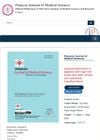 4 citations,
March 2006 in “Journal of renal nutrition”
4 citations,
March 2006 in “Journal of renal nutrition” Dialysis patients benefit from water-soluble vitamins but need careful management to avoid risks.
 7 citations,
January 2019 in “Brazilian Journal of Pharmaceutical Sciences”
7 citations,
January 2019 in “Brazilian Journal of Pharmaceutical Sciences” Maidenhair fern extract reduced anxiety and depression in rats and may work due to its antioxidant and anti-inflammatory properties.
 1 citations,
November 2016 in “Congenital Anomalies”
1 citations,
November 2016 in “Congenital Anomalies” Get head MRI for babies with achondroplasia early, use free immunoglobulin light chains to detect certain neurodevelopmental disorders, and video calls work for speech therapy in patients with facial anomalies.
 December 2022 in “Türk biyokimya dergisi”
December 2022 in “Türk biyokimya dergisi” The conclusions are: fecal short-chain fatty acids may help prevent cancer, fiber intake can reduce obesity, weight loss is hard for obese people, low BMI cancer patients are more prone to chemotherapy side effects, intermittent fasting benefits gut health, cherry laurel has health benefits in rats, certain gene variations can increase stress in hair loss patients, fecal acids can affect blood sugar levels, cold agglutinin can affect blood test results in autoimmune patients, and people with Crohn's disease have higher levels of a certain chemical in their blood.
 17 citations,
October 2006 in “Molecular and Cellular Endocrinology”
17 citations,
October 2006 in “Molecular and Cellular Endocrinology” The L457(3.43)R mutation in the human lutropin receptor causes increased activity and hormone insensitivity, leading to precocious puberty.
 16 citations,
October 2020 in “Lipids in Health and Disease”
16 citations,
October 2020 in “Lipids in Health and Disease” Leptin affects skin and hair health and may worsen some skin conditions, but more research is needed to understand its full impact.
 9 citations,
March 2022 in “Frontiers in Endocrinology”
9 citations,
March 2022 in “Frontiers in Endocrinology” About 19.4% of Iranian women in the study have Polycystic Ovary Syndrome, with the most common type involving irregular periods and high male hormone levels, but their heart and metabolic health is similar to women without the condition.
 November 2020 in “Elsevier eBooks”
November 2020 in “Elsevier eBooks” Antiandrogens and androgen inhibitors like spironolactone, finasteride, and dutasteride can treat hair loss and skin conditions, but they have risks and side effects, including potential harm to pregnant women and risks of cancer and heart issues. Herbal remedies also have antiandrogenic effects but lack safety validation.
 2 citations,
March 2015 in “World journal of acupuncture-moxibustion”
2 citations,
March 2015 in “World journal of acupuncture-moxibustion” Traditional Chinese medicine techniques like catgut embedment, moxibustion, and bloodletting showed better results for treating hair loss than the drug finasteride.
50 citations,
May 2018 in “International journal of cardiology” Testosterone is linked to cardiovascular risk factors and stroke, but its exact role is unclear.
 1 citations,
May 2017 in “Journal of The American Academy of Dermatology”
1 citations,
May 2017 in “Journal of The American Academy of Dermatology” People with alopecia areata often have lower vitamin D levels than healthy people.

High insulin levels are more common and a better predictor of carbohydrate issues in women with PCOS than glucose tolerance tests.
 14 citations,
January 1990 in “Fertility and Sterility”
14 citations,
January 1990 in “Fertility and Sterility” Some patients with high prolactin levels don't show symptoms because they have a form of the hormone that's less active.
 3 citations,
January 2016 in “International Journal of Trichology”
3 citations,
January 2016 in “International Journal of Trichology” Sheep-derived factors improve human hair cell clustering, which may help hair growth.
 1 citations,
December 1992 in “International Journal of Dermatology”
1 citations,
December 1992 in “International Journal of Dermatology” No significant hormone differences found in postmenopausal women with androgenetic alopecia.
1 citations,
January 2018 in “Skin appendage disorders” The complement system might be involved in the development of alopecia areata and could lead to new treatments.
 6 citations,
June 2011 in “British Journal of Dermatology”
6 citations,
June 2011 in “British Journal of Dermatology” People with alopecia areata have higher levels of RBP4 protein and antibodies against it.
54 citations,
October 2010 in “Clinics in dermatology” Diet, especially dairy and high-sugar foods, can cause acne.
 35 citations,
February 1994 in “Fundamental and applied toxicology”
35 citations,
February 1994 in “Fundamental and applied toxicology” High doses of finasteride cause cell growth and tumors in mice.
 13 citations,
March 2019 in “Physiological Research”
13 citations,
March 2019 in “Physiological Research” Overweight women with PCOS have higher levels of certain hormones that could indicate a higher risk of heart and metabolic problems.
 13 citations,
January 1995 in “Postgraduate medicine”
13 citations,
January 1995 in “Postgraduate medicine” Excessive hair growth in women can be harmless or signal serious health issues, and treatment often includes medication and hair removal, with noticeable results after 3-6 months.
 9 citations,
June 2019 in “Archives of Dermatological Research”
9 citations,
June 2019 in “Archives of Dermatological Research” Both topical calcipotriol and narrowband UVB improved alopecia, but combining them didn't enhance the effect on hair loss severity, despite higher vitamin D3 levels.
 7 citations,
January 2022 in “Evidence-based complementary and alternative medicine”
7 citations,
January 2022 in “Evidence-based complementary and alternative medicine” Ginger supplements helped reduce symptoms and improve metabolic health in hypothyroid patients.
 5 citations,
January 2020 in “The mental health clinician”
5 citations,
January 2020 in “The mental health clinician” Vitamin D supplements may reduce hair-pulling in people with Trichotillomania.
 3 citations,
January 1994 in “Toxicological Sciences”
3 citations,
January 1994 in “Toxicological Sciences” Finasteride causes abnormal growth in male mice cells at high doses.
 1 citations,
September 2012 in “Expert Review of Endocrinology & Metabolism”
1 citations,
September 2012 in “Expert Review of Endocrinology & Metabolism” Androgen replacement therapy can improve libido and mood in women with severe androgen deficiency, but more research is needed on its long-term safety.
 April 2022 in “PANACEA JOURNAL OF MEDICAL SCIENCES”
April 2022 in “PANACEA JOURNAL OF MEDICAL SCIENCES” People with both obvious and not-so-obvious underactive thyroid issues often have higher levels of the hormone prolactin.
 January 2004 in “Dermatologic Surgery”
January 2004 in “Dermatologic Surgery” Storing hair follicles in a special buffer with certain inhibitors can increase hair growth and improve transplant results.
January 1989 in “Handbook of experimental pharmacology” Drugs can change hair growth and this is important because it can upset people.
 239 citations,
July 2002 in “Clinical and Experimental Dermatology”
239 citations,
July 2002 in “Clinical and Experimental Dermatology” Low iron and L-lysine levels can cause hair loss in women, and increasing these nutrients can reduce hair shedding.


























